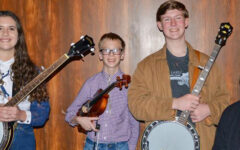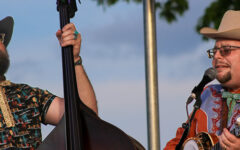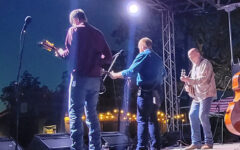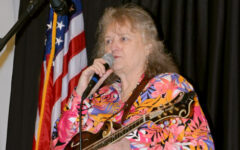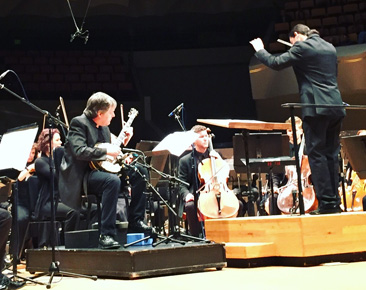
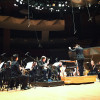 Somewhere in the midst of an album and EP with Abigail Washburn (with full-time touring and winning a Grammy), an album and touring with Chick Corea, performing his concerto, The Impostor, dozens of times, and being a father, the indefatigable Béla Fleck found time to write a new banjo concerto. I had the fortunate opportunity to catch it in the first of two shows at Boettcher Concert Hall in Denver, Colorado with the Colorado Symphony. The 3-movement piece follows the standard fast-slow-fast concerto format, with many conventional techniques of theme exposition, orchestral interplay, and pyrotechnic cadenzas. Yet that is about where the similarities end.
Somewhere in the midst of an album and EP with Abigail Washburn (with full-time touring and winning a Grammy), an album and touring with Chick Corea, performing his concerto, The Impostor, dozens of times, and being a father, the indefatigable Béla Fleck found time to write a new banjo concerto. I had the fortunate opportunity to catch it in the first of two shows at Boettcher Concert Hall in Denver, Colorado with the Colorado Symphony. The 3-movement piece follows the standard fast-slow-fast concerto format, with many conventional techniques of theme exposition, orchestral interplay, and pyrotechnic cadenzas. Yet that is about where the similarities end.
It seems Béla’s experience playing with dozens of orchestras, and getting the first concerto out of the way, has allowed him to write a piece that actually grooves even harder than his first, yet playing on the orchestra’s inherent strengths rather than pushing them into challenging or uncharted terrain. Overall, the piece, while going many places in its 30 minutes, does not pull together as many disparate grooves as The Impostor, and that is a good thing. As I wrote in 2011 about The Impostor, “If anything predominated, many moments of orchestration sounded like a symphony playing Flecktones-style music.” This is not the case in Juno. Orchestras can play fast, and in time, though they are seldom nimble. It seemed like Béla was able to write to these strengths in a more confident and effective way, while still having it be a showcase for banjo.
And to that effect, this piece seems very banjoistic. While clearly and implicitly virtuosic (it is Béla Fleck, and it is a concerto), there are a lot of rolls, pivots and droning off of open strings. In many places, it seems like he orchestrated lines that are more idiomatic to the banjo, pulling out cool parts of these phrases, and then rhythmically juxtaposing them with sections of the orchestra. For example, towards the end of the 2nd movement, a beautiful descending line comes from two different woodwinds, which is then echoed by the banjo, and thematically developed from there. The 2nd Movement is particularly beautiful, with a striking counterpoint-laden cadenza.
The third movement is absolutely burning. It starts off with what comes across as a bluegrass lick, yet as throughout, the piece is playing off the banjo’s inherent strengths. Juno is not orchestrated bluegrass, but ideas that sound good on the banjo explored in a symphonic setting. The finale is at once explosive, emotional, and undeniably awesome. I really dig this piece.
Maybe it goes without saying, but Béla’s own playing is top notch. He seems to have even more confidence in the soloist setting, possibly from all the times playing his first concerto. And maybe from his extensive time playing in such an exposed setting with his duo work with Abigail. He played the encore solo, which was a medley of Sunset Road and Dear Old Dixie. Playing both Earl Scruggs and his own masterpiece from the first Flecktones album seemed a fitting way to close the show.
The rest of the program was beautiful. The Chairman Dances by John Adams is related to his legendary opera Nixon in China. Here the word “dances” is a verb and not a noun, giving the work a new character. The Colorado Symphony also played Chôros No. 6 by Hector Villa-Lobos, a whirling 25-minute tour with elements of the Brazilian urban folk music, with echoes of the great Pixinginhua works, schmaltzy romantic sections, and pounding drums reminiscent of a Batería.
I know that Juno has been recorded, though no announcement has yet been made as to a label or a release. Once again, Béla will need to fill out an album with more music. I’m hoping for another piece with the indomitable Brooklyn Rider. While Night Flight Over Water seemed to be in the shadows of The Impostor, I personally loved (and preferred) it.

